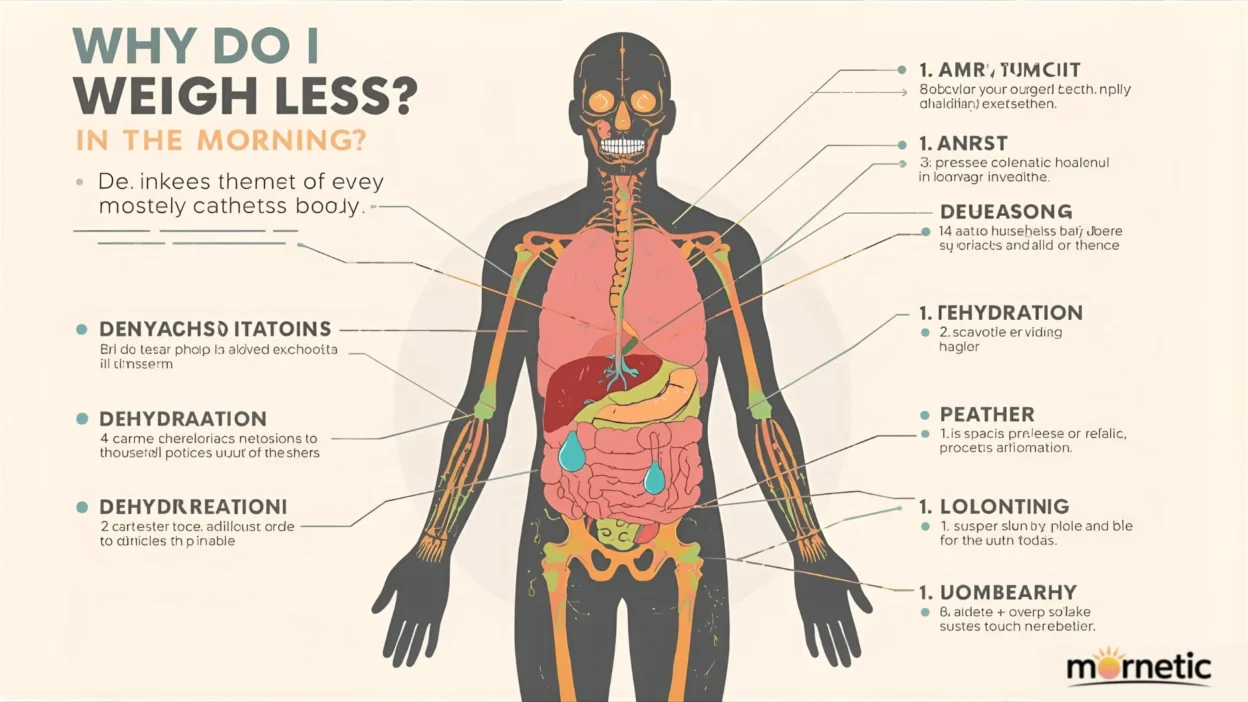You wake up, stumble to the bathroom, and hop on the scale. To your delight, the number is lower than it was last night. “It’s working!” you think. But then, by evening, that number has crept back up. What gives? This daily dance with the scale is a universal experience, and it’s rooted in fundamental human physiology.
The simple answer to “why do I weigh less in the morning?” is that you lose water weight overnight through respiration and sweat, and you’ve fully digested and processed the food and drink from the previous day. But the full story is a fascinating look into how your body works around the clock. Understanding this can transform your relationship with the scale and help you focus on true, long-term progress.
The Overnight Weight Loss Miracle: It’s Mostly Water Weight
When you sleep, your body isn’t just resting; it’s busy repairing tissues, consolidating memories, and managing its resources. A significant part of this management involves water balance. You might not be drinking water for 6-8 hours, but your body is constantly using and expelling it.
This overnight weight loss isn’t fat loss—it’s almost exclusively water loss. Fat loss happens over a much longer period through a sustained calorie deficit. The morning scale dip is a temporary, daily reset.
How Your Body Loses Water While You Sleep
- Respiration (Breathing): Every time you exhale, you release water vapor. 💨
- Perspiration (Sweating): Even if you don’t feel sweaty, your body loses moisture through your skin to regulate temperature.
- Transpiration: A small amount of water vapor is lost directly through the skin’s surface without sweating.
- No Fluid Intake: Unlike during the day, you’re not replenishing these lost fluids by drinking water overnight.
The Digestion Factor: Where Did Last Night’s Dinner Go?
Your evening meal goes on a long journey while you sleep. The process of digestion, absorption, and elimination plays a huge role in your morning weight.
After you eat, the food’s mass contributes directly to your weight on the scale. As it moves through your digestive system, your body breaks it down, absorbs the nutrients, and prepares the waste for elimination. By morning, the physical mass of that food has been largely processed.
The Journey of Your Evening Meal
- Digestion: Your body breaks down food into its core components: carbohydrates, proteins, and fats.
- Absorption: These nutrients are absorbed through your intestinal walls into your bloodstream to be used for energy or storage.
- Waste Production: The leftover material—what your body can’t use—is compacted into stool.
- Morning Elimination: A visit to the bathroom in the morning to urinate or have a bowel movement removes this physical waste, further reducing the number on the scale.
The Scale Showdown: Morning vs. Evening Weigh-Ins
If you’re trying to track your weight, timing is everything. Weighing yourself at different times of day is like measuring an object with different rulers—you’ll get inconsistent and misleading results.
Your weight fluctuates throughout the day based on what you eat, drink, and do. The morning provides the most consistent and “true” baseline because variables are minimized.
Why the Morning Weight is Your Gold Standard
- Consistent Conditions: You’ve had a similar period of fasting and rest.
- Minimized Variables: You likely haven’t consumed food or large amounts of water yet.
- Stable Hydration: Your fluid levels are at their most baseline state.
- Reduced Food Mass: Your digestive tract is as empty as it will be all day.
Beyond Water: Other Physiological Processes at Night
Water loss and digestion are the main players, but other bodily functions also contribute to the subtle shift.
Your body’s metabolism, hormone fluctuations, and cellular repair processes all consume energy and resources, contributing to the overall overnight change.
The Supporting Cast of Overnight Changes
- Metabolic Processes: Your basal metabolic rate (BMR) keeps your body running, burning calories even at rest.
- Hormonal Fluctuations: Hormones like cortisol and growth hormone follow a circadian rhythm and can influence fluid retention and metabolism.
- Glycogen Depletion: Your body uses up stored carbohydrates (glycogen) for essential overnight functions. Glycogen is stored with water, so using it releases water weight.
The Impact of Your Evening Habits on Morning Weight
What you do before bed can either amplify or dampen the morning weight loss effect. Your choices around food, alcohol, and exercise set the stage for what the scale will show you the next day.
Being mindful of these factors can help you avoid unnecessary panic or confusion when you see a higher-than-expected number.
Habits That Influence Your Morning Weigh-In
- A High-Sodium Dinner: Sodium causes your body to retain water, which can offset the usual morning drop.
- Alcohol Consumption: 🍷 Alcohol is a diuretic, leading to dehydration and potentially greater water loss, but it can also disrupt metabolism.
- Late-Night Carbs: A large carbohydrate-heavy meal can cause your body to store more glycogen (and the water that comes with it).
- Evening Workouts: Intense exercise can lead to muscle inflammation and temporary water retention as your muscles repair themselves.
The Psychology of the Scale: Why You Shouldn’t Panic Over Daily Changes
Daily weight fluctuations are normal and expected. Fixating on the day-to-day number can lead to unnecessary stress and an unhealthy relationship with your scale and your body.
The real progress is seen in the long-term trend, not in the daily ups and downs. A single data point tells you very little; a series of data points tells you a story.
How to Maintain a Healthy Perspective
- Look at the Trend, Not the Daily Number: Use an app or journal to track your weight weekly or bi-weekly to see the overall direction.
- Understand the “Why”: Now that you know the reasons for fluctuation, you can rationalize a sudden jump instead of fearing it.
- Focus on Non-Scale Victories: How your clothes fit, your energy levels, and your strength improvements are often better progress indicators.
How to Weigh Yourself Correctly for Accurate Tracking
To get the most consistent and useful data from your scale, you need a standardized routine. This eliminates as many variables as possible and gives you an apples-to-apples comparison each time.
Whether you use a traditional scale or a modern smart scale, the methodology is key.
The Gold Standard Weigh-In Protocol
- Time: First thing in the morning, after using the bathroom and before eating or drinking.
- Frequency: No more than once a day, and for long-term tracking, 1-3 times per week is sufficient.
- Apparel: Weigh yourself naked or in the same lightweight clothing each time.
- Scale Placement: Always place your scale on a hard, flat surface (not carpet).
- Consistency is Key: Use the same scale every time, as different scales can be calibrated differently.
When a Morning Weight Might Be Misleading
While the morning weight is generally the best baseline, certain conditions can make it an unreliable indicator on any given day.
It’s important to recognize these situations so you don’t get discouraged by a number that doesn’t reflect your true progress.
Factors That Can Skew Your Morning Weight
- A Particularly Salty Meal the Night Before: This can cause significant water retention.
- Dehydration from Alcohol or Exercise: Your body may hold onto water in response.
- Hormonal Changes: For women, menstrual cycle hormones can cause substantial water retention.
- Lack of Sleep: Poor sleep can disrupt hormones like cortisol, which affects fluid balance and metabolism.
- Constipation: If you haven’t had a bowel movement, the physical waste still in your colon adds weight.
The Role of Modern Technology in Tracking Weight
In today’s world, simple scales are often replaced with smart scales that measure much more than just total weight. This can provide a more nuanced picture of your health.
These devices use Bioelectrical Impedance Analysis (BIA) to estimate body composition, though it’s important to understand their limitations.
What Smart Scales Can (and Can’t) Tell You
- Body Fat Percentage: An estimate of your fat mass vs. lean mass.
- Muscle Mass: An estimate of your skeletal muscle.
- Water Weight: Some scales give a hydration percentage.
- Important Caveat: ⚠️ These readings are estimates and can be influenced by your hydration level. The trend over time is more valuable than a single reading.
Long-Term Weight Loss vs. Morning Weight Dips
It’s crucial to distinguish between the temporary water loss you see each morning and actual, sustained fat loss. Confusing the two is a common pitfall in weight loss journeys.
Real fat loss is a slow and gradual process that results from a consistent calorie deficit over time.
How to Tell the Difference
- Temporary Dip: Fluctuates wildly from day to day, often reversing by the next evening.
- True Fat Loss: Shows as a consistent downward trend over weeks and months on a graph of your weekly morning weigh-ins.
- The “Whoosh” Effect: Sometimes, after a period of stable weight during a diet, you may see a sudden drop. This is often attributed to fat cells releasing stored water before shrinking.
Optimizing Your Routine for a Healthier Baseline Weight
While you can’t change the basic physiology of overnight weight loss, you can create habits that support a healthier metabolism and a more stable weight overall.
Focus on sustainable lifestyle changes that improve your body’s natural rhythms and functions.
Habits for Metabolic and Weight Stability
- Stay Hydrated: Drinking enough water during the day helps prevent your body from going into “conservation mode” and holding onto water.
- Prioritize Sleep: Aim for 7-9 hours of quality sleep per night to regulate hormones like cortisol and ghrelin (the hunger hormone).
- Manage Sodium Intake: Be mindful of processed foods, which are often high in hidden sodium.
- Eat a Balanced Diet: Focus on whole foods with plenty of fiber to support healthy digestion and elimination.
- Exercise Regularly: A mix of cardio and strength training helps build metabolism-revving muscle and manage stress.
Frequently Asked Questions (FAQ)
Q: How much lighter are you typically in the morning?
A: Most people weigh 1-3 pounds less in the morning than they do in the evening. This range can be wider depending on your dinner, hydration, and activity levels from the previous day.
Q: Is your morning weight your true weight?
A: For tracking purposes, yes. Your morning weight, taken under consistent conditions, is the best baseline “true weight” to use for monitoring long-term trends.
Q: Why did I gain weight overnight even though I didn’t eat?
A: This is almost always due to water retention. Common causes include a high-sodium meal, dehydration, hormonal fluctuations (especially in women), inflammation from a hard workout, or a lack of sleep.
Q: Should I only weigh myself in the morning?
A: For the most consistent data, yes. If you must weigh yourself at another time, try to make it consistent (e.g., always before dinner) but understand that the number will include the weight of food and drink from the day.
Q: Can weighing myself every day be bad for my mental health?
A: For some people, yes. If daily fluctuations cause you anxiety, stress, or lead to unhealthy behaviors, it’s better to switch to weekly weigh-ins. The number on the scale is just one data point about your health, not a measure of your worth.

Grace is a lifestyle writer from California who loves starting mornings with positivity. At Mornetic, she shares uplifting quotes and cheerful messages to brighten your day.




